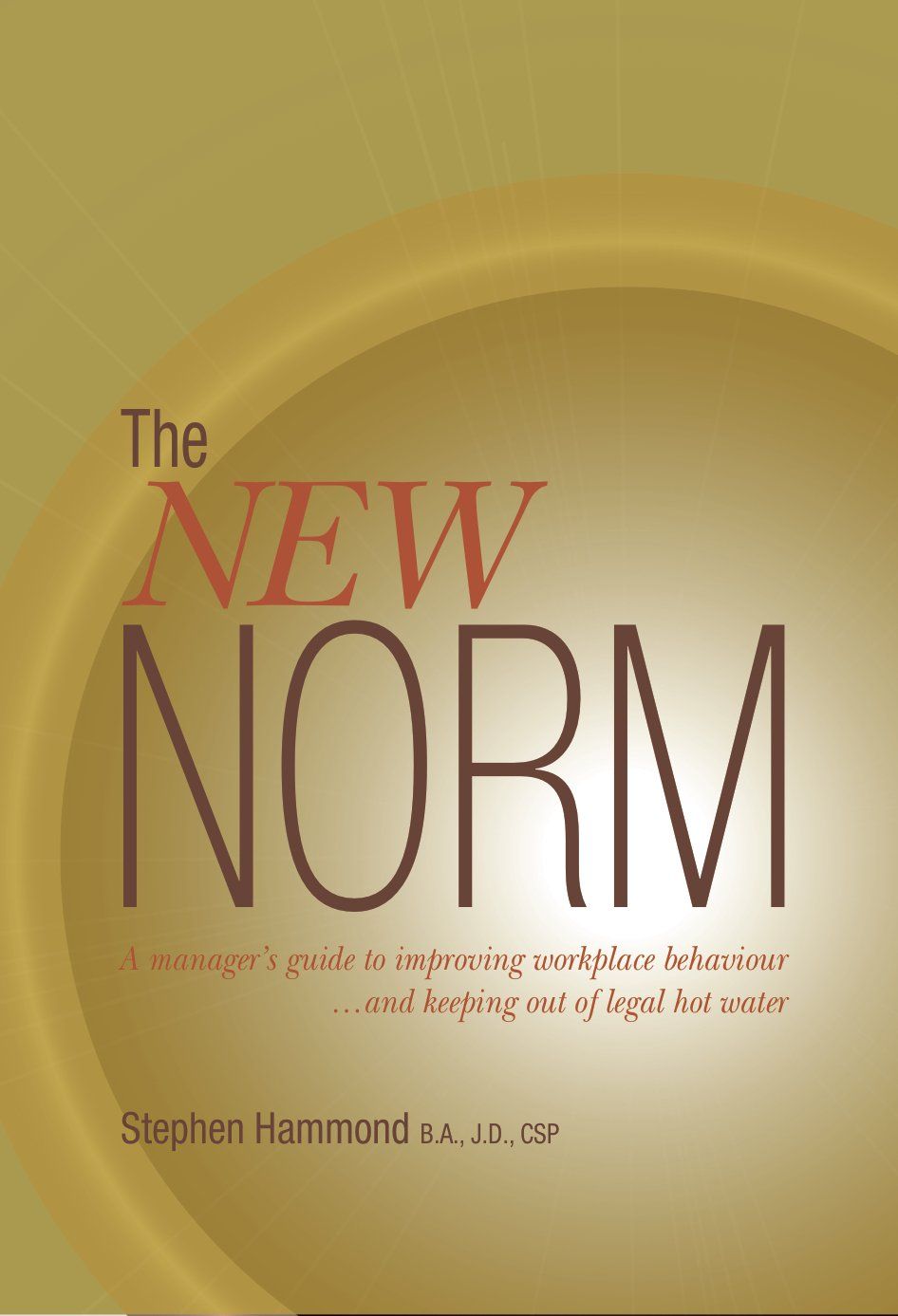Chapter six
THE NEW NORM accepts that he won't always get his way
When union members at Edmonton’s Finning Canada plant voted down a collective agreement previously agreed to by their union and the company, there was a lot of frustration. Many employees/members felt the renewed bargaining was going too slowly, so they voluntarily began refusing overtime work. The union did want to cut down on overtime, but it was not a requirement.
Gilles Leclerc agreed with fellow union member Ted Turgeon that he should refuse overtime. He did so for three to four weeks, but began picking up overtime shifts after that.
When Turgeon asked him to stop working overtime, Leclerc said he would do so only if he received a letter from their union saying overtime was banned.
A number of Leclerc’s fellow workers didn’t like this, and some of them took action by writing “scab” on his locker and filling one of his boots with urine.
After a weekend during which Leclerc worked more than twenty hours of overtime, Turgeon approached Leclerc and started clapping his hands and shouting “scab, scab” and “fucking scab” for thirty to forty-five seconds in front of other employees. When Leclerc complained, the company investigated and suspended Turgeon for one and a half days without pay.
His union grieved the suspension, saying he should receive no suspension at all. They said a single incident is not actually “harassment” by its true definition. When the company and union could not agree on the issue of discipline, the matter went to binding arbitration. After reviewing all the relevant testimony and documents, the arbitrator wrote this:
“I accept the Union's argument that not every rude word used against a co-worker is cause for discipline. To turn a harsh comment into a disciplinable offence the Employer needs to show it has some legitimate managerial interest in the matter. In this case I find that there was a sufficient managerial interest to justify some discipline.
“Firstly, there is an interest in protecting one employee from verbal abuse by another. Without this, employees in sufficiently serious circumstances may choose to take matters into their own hands rather than relying upon management to maintain order in the workplace.
“Second, what Mr. Turgeon did here went beyond a comment to Mr. Leclerc. What he did and clearly intended to do was to embarrass him publicly in front of his co-workers. He chose to create a bit of a spectacle. He was loud and clapped so as to attract attention. This disrupted work and heightened Mr. Leclerc's humiliation.
“Thirdly, it was clearly to achieve an illegal purpose which was to convince Mr. Leclerc, by humiliation, to go along with the other employees in a concerted refusal of overtime. These facts, taken together, create the necessary Employer interest to justify treating the conduct as worthy of discipline.”
The arbitrator conceded that perhaps the comments and behaviour of Turgeon were not “harassment” on the same level as sexual or racial harassment, but he wrote that “it was clearly ‘harassing’ under the ordinary dictionary meaning of the term…”
Perhaps if Mr. Turgeon had taken my Respectful Workplace online course, he would have learned that you don’t need a formal determination of “harassment” to receive punishment and his behaviour is considered bullying and contributes to a toxic workplace.
He concluded that it was bad enough to warrant some kind of discipline. However, the union argued that even if it was worthy of some discipline, a suspension without pay was going too far and the arbitrator should consider reducing the penalty.
On this, the arbitrator wrote, “He has never apologized to Mr. Leclerc. My sense was that he felt strong disapproval of Mr. Leclerc's choices at the time and has not changed his views. That is his choice, but it is not a basis for mitigating the penalty. Mr. Turgeon's general demeanour in giving his evidence suggested that his conduct was jocular.
I do not accept that this properly reflects the tone of his action at the time. He tended to laugh off management's view of the matter and showed little indication of recognizing, much less appreciating, management's concerns. In these circumstances I see no basis for varying the penalty imposed.”
This case shows that some people may feel so strongly about their particular point of view, they will go out of their way to convince people through “humiliation,” as the arbitrator wrote. Harassing a union brother or sister is not the way to get what you want.
The OLD NORM
- won’t let legitimate processes such as (but not exclusively) labour negotiations proceed as they should.
- tries to get his way by coercion, intimidation and humiliation.
- will take matters into her own hands; she doesn’t have time to be polite.
- knows that others, even if they oppose the inappropriate tactics taken, won’t say anything, for fear of being seen as unsupportive.
The NEW NORM
- may be frustrated by the actions of one person, but won’t stoop to intimidation and humiliation.
- uses persuasion and respectful reasoning to make a point or argument.
- will stand up to bullies, even when there is strong pressure from others to not rock the boat.
- who feels strongly about his position tries to get a majority of his colleagues/members to overturn the leadership’s previous decision…in an orderly fashion.
Suggestions for the New Norm:
01
Listen to Mick Jagger. You can’t always get what you want. As much as we feel passionately about something, we’re not always going to get our own way. It doesn’t work that way.
02
Be persuasive. If you feel strongly about an issue, and you’re not the “boss,” you’re going to have to convince others to take your side. If you want your union to ban overtime as a form of labour pressure, make your best pitch to your union. Don’t abuse your fellow union members. Or if you’re not in a union and you want certain action to be taken at work, but upper management doesn’t agree, make your best pitch to upper management. Don’t blame others at work who are following the direction of management.
03
Apologize. There are many forms of litigation where the adjudicator is looking for some chance to lessen the penalty against you. Yes, you did something wrong, but you’re human. If you apologize, and seem sincere about it, everyone might just chalk it up to a “bad day” or something that triggered an otherwise reasonable and rational person. If you’re not interested in apologizing when you were clearly in the wrong, then you deserve the lumps you are given.
This chapter lets you know that bullying behaviour at work, even between union members, can lose
you pay.
For more examples of bullying at workplace harassment, consider reading
Chapter 26: The New Norm ensure his house is “clean”
Purchase a copy of The New Norm, or if you think all your supervisors and managers, could learn many valuable lessons about creating a respectful workplace, free of harassment, bullying and discrimination, you can get volume discounts.
What one reader has to say about Stephen’s book,
The New Norm
“Stephen’s book is a brilliant reminder of workplace situations that are disturbing, yet slip by unaddressed by so many in both the private and public sector. When these behaviours are unaddressed, they become the norm because we allow them to be.
Just like his first book, Stephen is insightful, his writing is moving and he inspires his readers to take immediate action to disapprove of, and address harassment and other inappropriate behaviour every time we see it, feel it and hear about it. In a concise format, he gives us a series of snapshots of old vs. new, acceptable vs. unacceptable, right vs. wrong, in a way that is understandable.
If workplace leaders take just some of Stephen’s practical advice, they will go a long way to rid their workplace of unacceptable behaviours such as harassment, discrimination and bullying. It’s clear that to create Stephen’s “New Norm,” we need to ACT NOW! We can’t wait any longer.”
Tatjana Zatezalo
Manager, Organizational Development, Halifax Regional Municipality

Respectful Workplace Online Training Course
If you, your employees or your managers want more information,
sign up for my new online training course:
The Respectful Workplace in Canada.
With 10 modules of useful, relevant and current information,
this course can help everyone at your workplace.
This may be the best online harassment training your people will get.
Stephen Hammond is a lawyer turned speaker and consultant in the field of harassment, sexual harassment, bullying, discrimination, diversity and inclusion at work.
The New Norm is Stephen’s third book.


